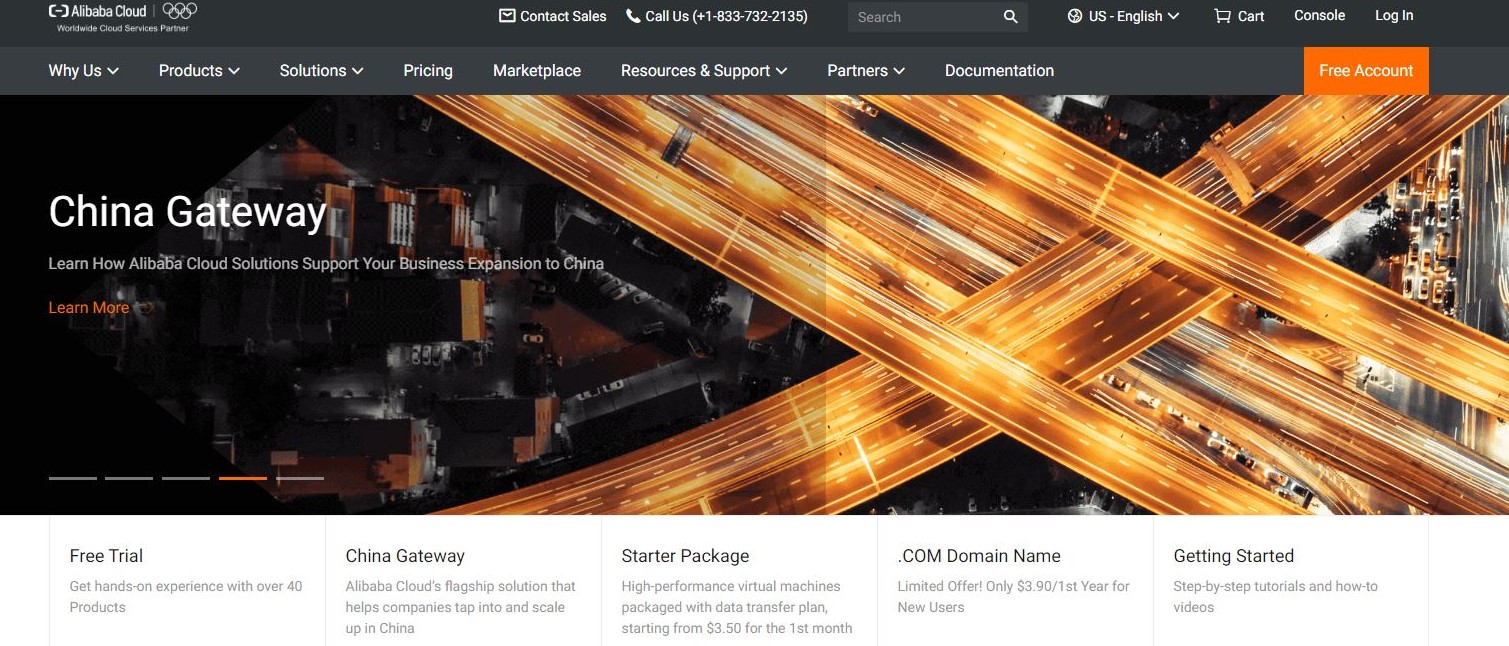TechRadar Verdict
Alibaba Cloud will provide you with everything you need for a personal blog, or small and medium-sized businesses, but it will refuse to hold your hand through the process.
Pros
- +
Several data centers to choose from
- +
There is a free trial for new users
- +
Flexible billing options to meet everyone’s needs
Cons
- -
Limited hosting services
- -
Custom cPanel better suited for more advanced users
- -
No one-click installation
Why you can trust TechRadar
Alibaba Cloud, previously known as Aliyun, is a Chinese web hosting provider that specializes in cloud computing and it has been in the business since 2009. They exist as a branch of Alibaba Group and are headquartered in Singapore, and have data centers in over 20 regions and more than 60 availability zones around the world. At present, they claim to have more data centers and CDN nodes in Asia-Pacific region than any other cloud service provider. Likewise, they take great pride in having over three million customers at this time and in more than 300 countries and regions, thanks to their countless cross-industry solutions. In addition, they consider themselves to be the number one in China, Asia-Pacific and the third best cloud hosting provider in the world.
Their main website is in English by default, but it is available in multiple languages as well, among them, as expected, Mandarin and a few other Chinese dialects, followed by German, French, Central Thai, Indonesian and Vietnamese. Although the site may seem a bit overwhelming at first, we had no trouble navigating around and finding all the relevant information. Locations of all their data centers, inside and outside the mainland China, are marked on the map, as well as the locations of all of their global offices.
- Want to try Alibaba Cloud? Check out the website here
In 2019 Alibaba Cloud started a global initiative named “Tech for Change” which calls for potential partners, both individuals and organizations, to work together using technology for the betterment of the world in the field of education, socio-economic and environmental development and sustainability.
A few articles are highlighted at the bottom of Alibaba Cloud’s webpage and from there you will be able to access their blog. There, you’ll be literally bombarded with articles, top-ten lists for posts, bloggers for the last week and the last month and the most popular bloggers in general. Articles are automatically sorted by date, but you have the option to change the order by choosing one of given categories, some of which include Tutorials, Security, Trends, Big Data and A.I. The blog seems to be updated with great enthusiasm judged by the number of articles which have been published just in the last couple of days.
Plans and pricing
Alibaba Cloud offers a wide and diverse range of enterprise-level cloud-related services such as elastic computing, relational databases, big-data processing, storage hosting, content delivery networks, anti-DDoS protection, domain solutions and more.
All cloud services are available on a pay-as-you-go basis and pricing system is transparent and rather simple, which is refreshing to see.
As for paying method, they accept credit/debit cards, PayPal, Paytm (exclusively for the Indian customers) and Alipay (for the Chinese customers), which you’re probably familiar with if you’ve been ordering stuff from China over the past few years.
Sign up to the TechRadar Pro newsletter to get all the top news, opinion, features and guidance your business needs to succeed!
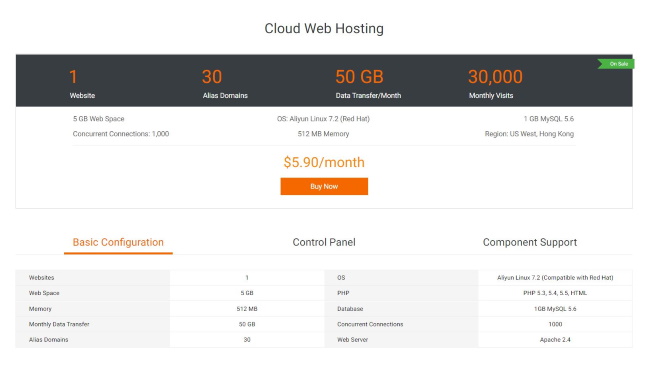
Thankfully, Alibaba Cloud provides its customer with a free trial on a plan worth up to $1300, but just for those that have been registered for less than a year, which seems reasonable enough. In addition, you’ll be able to choose from more than 20 products that are permanently free-of-charge.
| Yes | No | Header Cell - Column 2 | Header Cell - Column 3 |
|---|---|---|---|
| Cloud hosting | Colocation hosting | Row 0 - Cell 2 | Row 0 - Cell 3 |
| Linux hosting | Green hosting | Row 1 - Cell 2 | Row 1 - Cell 3 |
| VPS hosting | Managed WordPress Hosting | Row 2 - Cell 2 | Row 2 - Cell 3 |
| Dedicated hosting | Free hosting | Row 3 - Cell 2 | Row 3 - Cell 3 |
| Windows hosting | Bare metal hosting | Row 4 - Cell 2 | Row 4 - Cell 3 |
| Small business hosting | Video hosting | Row 5 - Cell 2 | Row 5 - Cell 3 |
| Row 6 - Cell 0 | Shared hosting | Row 6 - Cell 2 | Row 6 - Cell 3 |
| Row 7 - Cell 0 | Email hosting | Row 7 - Cell 2 | Row 7 - Cell 3 |
| Row 8 - Cell 0 | WordPress hosting | Row 8 - Cell 2 | Row 8 - Cell 3 |
| Row 9 - Cell 0 | Website builder | Row 9 - Cell 2 | Row 9 - Cell 3 |
| Row 10 - Cell 0 | E-commerce hosting | Row 10 - Cell 2 | Row 10 - Cell 3 |
| Row 11 - Cell 0 | Managed hosting | Row 11 - Cell 2 | Row 11 - Cell 3 |
| Row 12 - Cell 0 | Reseller hosting | Row 12 - Cell 2 | Row 12 - Cell 3 |
Ease of use
If you have any doubts about how to create your Alibaba Cloud account, there is a thorough how-to video right next to the hosting plan presentation. To start the process though, you’ll need to enter a lot of personal information but most of the questions are fairly standard. Your password has to contain 7 to 20 characters and for the proper strength the mixture of letters, numbers and symbols is advised. You can choose if you want to receive the verification code by email or mobile phone, and it should be there in a few seconds.
After this, you’ll have to choose the type of account, and if you are an individual and not a company, you’ll be getting a free trial of considerable worth including a 12-month trial of flexible compute service with one core 1GB memory and over 40 different related products. Further identity verification is required to be done via mobile phone.
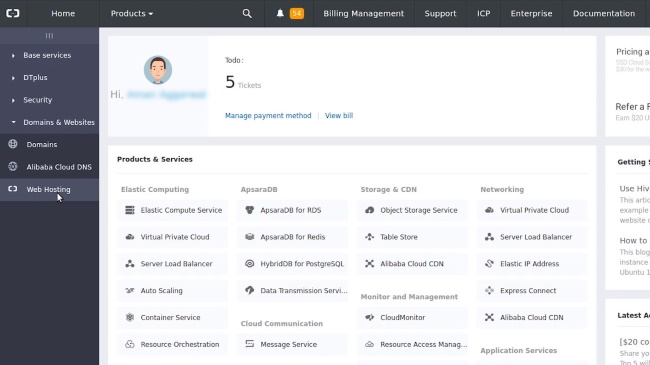
The interface of Alibaba Cloud console seems quite intimidating at first, since it is designed to provide professional users with an easy access to all of Alibaba Cloud's numerous services. After clicking on a webhosting icon under the “Domains & Websites” section, you can choose to purchase a hosting plan and everything will begin to clear up for you. There is no one-click installer, so if you want WordPress or Joomla, you’ll probably need to consult a how-to support page, because trial-and-error methods could take a while.
Alibaba Cloud uses a non-standard cPanel which doesn’t provide a user-friendly approach for the less tech-savvy users. Additionally, there is no website builder nor anything analogous to cPanel's file manager and installing additional applications will require you to upload files via FTP, enter the required information to enable a quick connect and expand files to a folder of your choice upon the confirmation. If all of it sounds unnecessarily complicated and a bit intimidating, it's because it really is, but on the bright side, every step of the process has a fitting guide to provide a helping hand.
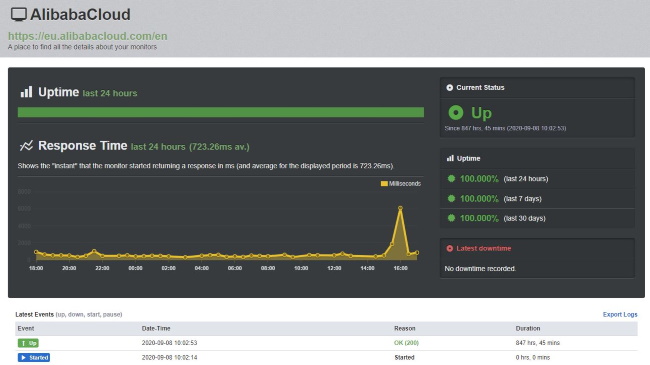
Speed and experience
When it comes to speed, the GTmetrix test we ran on Alibaba Cloud’s main website didn’t exactly show the results we were hoping for. While an average result is normally around 8.4 seconds, it took 10.2 seconds to fully load the page, and 130 requests in comparison to the average of 89. However, the total page size is 2.39MB, which is well below average and deserving of moderate praise.
On the other hand, an uptime test running on their main page for a whole month showed nothing but a satisfactory performance. Although it sounds unlikely, the test showed no downtime at all and merely one significant spike in response nearing the end, which implies 100% uptime. Admittedly, one month doesn’t equal a full year, but since Alibaba Cloud offers a free trial, you can always change your mind without any consequences.
Support
When support is concerned, Alibaba Cloud offer various types of self-service as well as assistance via live chat, ticket system and toll-free telephone.
In addition to the recently created yet decent knowledgebase, they provide a document center, a blog, a helpful FAQ section, forum and quite detailed step-by-step tutorials, all with pictures. These tutorials are divided into groups by different sections, such as “For New Users”, “Website Deployment”, “App Development” and more, which demonstrates a very user-friendly approach.
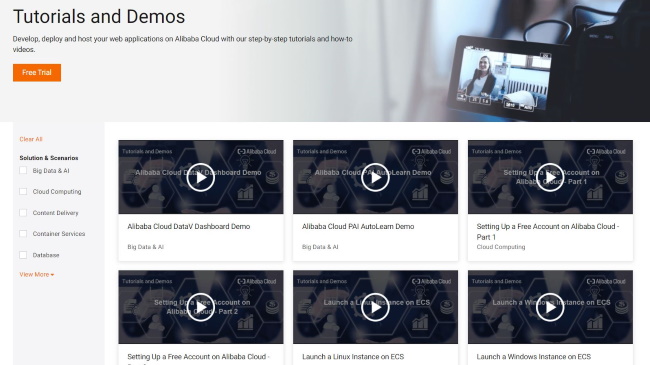
In addition, they’ve recently created a so-called “Video Center” with a variety of self-promotional videos. More importantly, it also features numerous video tutorials and demos covering the most relevant topics.
Alibaba Cloud has also launched an e-magazine, a free-of-charge bi-monthly publication which aims to present the latest news, stories, and technologies and, to quote, “give insight into how technology is changing the world and shaping the future as exemplified by our endeavors.” Whether their efforts yield results or not, it’s a commendable goal, by all means.
The Alibaba Cloud’s support forum seems to be active and we couldn’t find a single question left without at least one reply, provided either by users or the company’s employees.
The competition
Both Alibaba Cloud and Gandi are good choices for slightly more experienced users. Both offer free trials (although Gandi’s doesn’t require credit/debit card info), transparent and flexible pricing and budget-friendly plans for beginners. However, this is where the similarities end. Considering that Gandi offers basic shared, email and WordPress hosting in addition to cloud hosting, Gandi might be a better choice if that is what you need.
Hostgator is one of the most popular hosting options in the world and Alibaba Cloud’s fame is growing slowly but steadily. If we exclude geography and a number of hosting options, the key difference is that Hostgator offers a website builder, standardized cPanel as well as newbie-friendly approach, which could be a defining factor for many.
Compared with Alibaba Cloud, Bluehost offers a significantly wider range of hosting options and everything a beginner needs without the need to feel intimidated. However, if one is specifically looking for a cloud hosting solution and is a relatively experienced user, Alibaba Cloud will fit the bill.
Baget and Alibaba Cloud offer equally competitive prices, a great deal of features and competent 24/7 customer support. However, while Alibaba Cloud offers everything in English (and a few additional languages), Beget is less geared towards the international market and more towards the clients from Russia.
Final verdict
Although Alibaba Cloud provides a myriad of enterprise-level cloud-based products and technologies, and offers a range of quality services to most businesses, their web hosting plans are somewhat limited, and more so in comparison with a number of competitors. The services they do offer are first-rate and prices are budget-friendly, but Alibaba Cloud is currently hardly a match to world’s top providers such as Hostgator or Bluehost.
- We've also highlighted the best web hosting services

Mike is a lead security reviewer at Future, where he stress-tests VPNs, antivirus and more to find out which services are sure to keep you safe, and which are best avoided. Mike began his career as a lead software developer in the engineering world, where his creations were used by big-name companies from Rolls Royce to British Nuclear Fuels and British Aerospace. The early PC viruses caught Mike's attention, and he developed an interest in analyzing malware, and learning the low-level technical details of how Windows and network security work under the hood.
